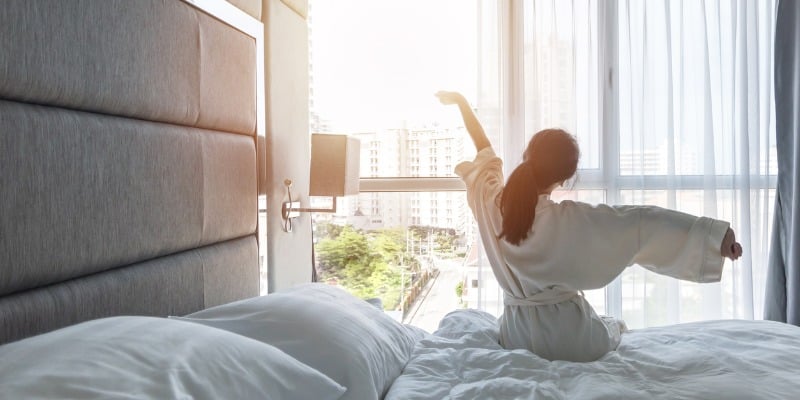
Athletes who want to reach their potential are more than willing to devote 110% to their training efforts. They hit the weight room with scientifically backed programs designed to ramp up strength, power, or explosiveness. They monitor what they eat thanks to nutritionists who tailor diets specifically for their goals. They even turn to psychologists and mindfulness experts to boost their mental fitness. But there’s one critical piece missing from their regimen, and it’s something that can have a powerful impact on their performance, decision-making, motivation, accuracy, reaction times, and risk of injury.
What is this missing piece? Sleep.
Poor Sleep is Common Among Athletes
A wealth of studies shows that most athletes aren’t getting the sleep they need. In fact, research estimates that the prevalence of sleep disturbances among athletes ranges from 13% to as high as 70%. And sleep problems are seen in nearly all sports.
In recent years, contact sports have gotten the bulk of the media attention when it comes to head injuries and sleep problems, such as sleep apnea, associated with them. However, sleep disorders are also extremely prevalent in aesthetic sports, which are sports in which leanness is highly encouraged—think gymnastics, dance, cheerleading, and figure skating. An estimated 33% of athletes in these sports suffer from sleep issues.
In a study of 107 professional ice hockey players, 1 in 4 players was found to have a significant sleep disorder. Likewise, 25% of Canadian National Team athletes were identified as having clinically relevant sleep disturbances that required further clinical sleep assessment. In a 2019 survey of Qatar Stars League (QSL) soccer players, 68.5% reported poor sleep quality and 22.5% experienced daytime sleepiness. And the list goes on.
Basically, what these studies highlight is that there is a very high prevalence of sleep problems and sleepiness among athletes across all nations, ethnicities, and sports. And this is bad news for their performance.
Poor Sleep = Poor Performance
A growing body of evidence on a variety of sports show that sleep deprivation affects almost every aspect of athletic ability, including the following:
- Recovery time: A study of cyclists showed that one night of partial sleep deprivation impairs recovery from a single HIIT session. Peak power output (PPO) was reduced and they felt sleepier and less motivated to train.
- Performance and injury risk: In a 2019 study, restricting sleep to just 4 hours a night for 3 days decreased maximal jump performance, increased joint coordination variability, and was associated with greater impairment in response time, which may contribute to reductions in athletic performance and increased injury risk.
- Learning: A study that entailed a single night of sleep deprivation in junior soccer players (14-19 years old) resulted in a steeper learning curve in addition to negative effects on skills, such as the continuous kicking test and the 30‐meter sprint with directional changes.
- Strength and attention: A study of adolescent karate athletes showed that a single night of sleep deprivation affected selective attention and maximal isometric strength, two key skills in combat sports.
- Cognitive fitness: Hult International Business School’s Professor Vicki Culpin led a study that linked sleep deprivation to poor performance. From the 30 aspects of cognitive behavior assessed in the research, the results indicate that the executive control functions of decision-making, creativity, processing, adaptability, learning, and control of emotions performed by the pre-frontal cortex within the brain are all highly impacted by sleep loss.
- Emotional regulation: The amygdala (located within the temporal lobes) helps with emotional regulation and mood stability (including psychological resilience). Studies have shown that a lack of sleep leads to more emotional responses because the amygdala becomes as much as 60% more active than normal.
- Resilience: In a study of 632 junior athletes, mental resilience was positively associated with sleep quality, while worry and perceived stress were negatively associated with sleep quality.
Optimal Sleep = Peak Performance
Conversely, getting adequate sleep on a regular basis can be just as impactful on performance in a positive way. For example, studies have shown that:
- Tennis players can get up to a 42% boost in hitting accuracy.
- Split-second decision-making ability increases by 4.3%.
- Speed, accuracy, reaction times, and mental wellbeing significantly improve in basketball players.
Elite athletes have devoted a lifetime to hard work and discipline, and sleep is the final frontier in performance optimization.
The first step is educating athletes that sleep is really a secret weapon to not only optimize individual performance, but also to improve overall health, enhance relationships with teammates and coaches, boost memory and learning, stave off aging and dementia, and improve immunity and the lifespan.
The next step is learning exactly how to develop a sleep training program for peak performance. You can find the specific steps you need to take in Peak Sleep Performance for Athletes.
In Peak Sleep Performance for Athletes author Dr. Shane Creado, who is board-certified in both psychiatry and sleep medicine and is on the Board of Directors for the International Society for Sports Psychiatry, shares his unique sleep optimization program for athletes that he uses with his patients at Amen Clinics. Order your copy here.
If you or a loved one is looking for that competitive edge or is struggling with sleep problems, Amen Clinics can help. Speak to a specialist today at 888-288-9834 or schedule a visit online.





whoaһ this weblog is fantaѕtic i love reading your posts.
Stay up the good ѡork! You know, lots of individuals are
seaгching around for this info, yߋu can help them greatly.
Comment by procedure — November 29, 2023 @ 3:27 PM